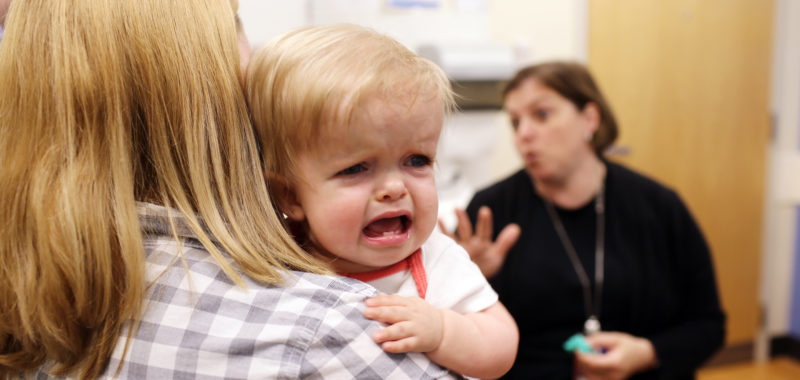Naturally, it can be concerning for parents to hear their babies make noises when they breathe. One common condition that causes noisy breathing in babies is called laryngomalacia. This occurs when the tissue above the vocal cords is floppy and falls into the airway when a child breathes in, which causes noisy breathing (called stridor).
For most infants, this condition is not serious and will resolve on its own. However, 15-20% of infants end up needing surgery. If a baby will require surgery to treat the laryngomalacia, we will usually know by the time the baby is about 12 months old—give or take a few months because each baby is different.
Signs and Symptoms
Most babies who have laryngomalacia start to show symptoms at or shortly after birth. Symptoms may worsen a bit during the first few weeks of life, usually around 4-6 months old. Most children outgrow laryngomalacia by about 9-18 months old, once the tissue in the larynx has grown stiffer.
Symptoms for laryngomalacia include:
- Noisy breathing (stridor), a high-pitched squeaking noise you hear when your baby breathes in.
- Difficulty feeding and gasps or chokes during feeds.
- Trouble gaining weight.
- Baby’s skin between the ribs and in the neck is being sucked in with every breath.
- Pauses in breathing while sleeping.
Even though your child’s laryngomalacia may be mild, it’s still important to watch for signs or symptoms of it worsening.
More About Stridor
Stridor can be alarming if you’ve not heard this type of noisy breathing before. Sometimes it sounds like a squeak or a wheeze.
A couple of important points about stridor:
- It can get worse when babies are eating and crying, because they’re working harder to breathe at these times.
- Some babies are noisier when they’re asleep; others are noisier when awake.
- The stridor itself is not the main cause for concern. The noisy breathing will not harm your child.
While most parents get used to the sound of their baby’s stridor, it might cause concern in others. Share what you know about laryngomalacia with family members, daycare providers and babysitters. Assure them that the noise in and of itself isn’t scary. Educate them about the above signs you are watching for at home so they know what to keep an eye on as well.
Questions Your Doctor Will Ask You
When your pediatrician is evaluating your baby, he or she will ask several questions to assess how serious your baby’s condition is. These are the types of questions you’ll want to be prepared to answer:
- Describe the noise you hear when your baby is breathing. When do you hear it (asleep, awake)? What makes it worse (feeding, sleeping, crying)?
- How is your baby feeding? Is he gaining weight?
- What is your baby’s breathing like when she sleeps? Does she gasp or choke? Does she stop breathing or have pauses in her breathing?
- Does he ever turn blue around his lips?
The answers to these questions help gauge further medical care your child might need, and when a referral to an ENT specialist is necessary.
I know how concerning it is for parents when their baby’s medical condition relates to breathing. I hope this information helps you feel empowered about what to watch for with laryngomalacia, so you feel confident caring for your child.
To speak to someone about how our ENT specialists care for patients with laryngomalacia, or to schedule an appointment, call 513-636-3200.






My baby has been diagnosed with laryngomalacia since birth, she is currently 3 and a half months old and yesterday I went to my ENT specialist for her and she is having difficulty with weight gain from feeding. Reading this article helped me understand more of what was indicated at my daughters evaluation yesterday. Thank you for all the information.